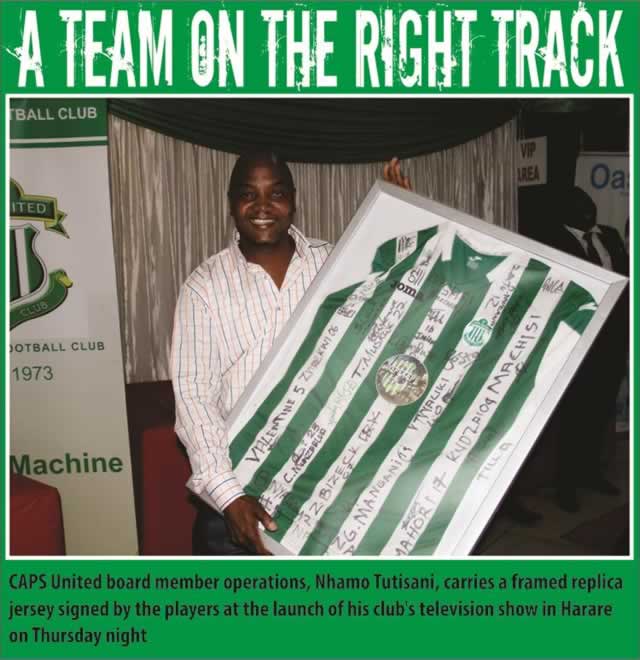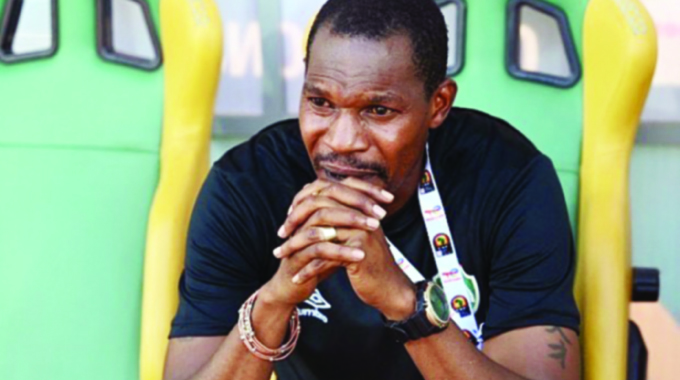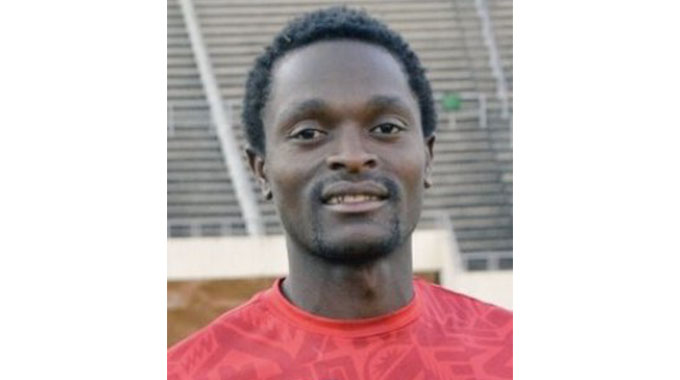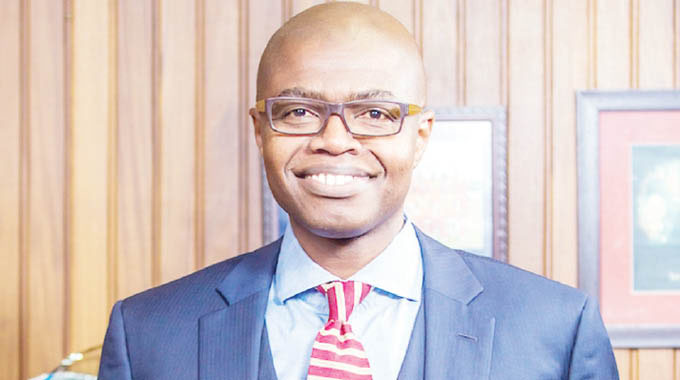‘SO LITTLE DONE, SO LITTLE TIME LEFT,’ AND EVERY WORD IN THE PHRASE APPEARED MEANT FOR CUTHBERT DUBE

 Sharuko On Saturday
Sharuko On Saturday
THE end came where it had all begun, one sunny autumn morning in 2010, just two months before Boys from Brazil brought their samba football here, and the FIFA World Cup bandwagon rolled into Africa for the first time in 80 years.
On those hallowed grounds of a school famed for its sporting excellence, which bred an iconic golfer who rose to become world number one in the ‘90s, the immortal Nick Price, the journey had begun under a blaze of great expectations as a nation dared to dream.
Those grounds that bred a burly chicken farmer who, in his other life as a cricketer was so good he even claimed a hat-trick against England in an ODI in January 1997 and, at the ripe age of 34, became the oldest cricketer to achieve such a feat.
Eddo Brandes was not only a cricketer who ripped through the defences of batsmen, even when he was on the other side of thirty, he also could frustrate the very best bowlers in the world, none better than Glenn McGrath, the Aussie whose superb line and length turned him into one of the greatest fast bowlers of all-time. And, such was McGrath’s frustration to dismiss Brandes, every time they played against each other, the fast bowler, being an Aussie who was accustomed to using sledging as a weapon, once chose to attack the Zimbabwean with the phrase, “Why are you fat?” hoping that would break his spirit and defence.
Of course, Brandes, being a fast bowler himself, decided to fight fire with fire and his sharp response, “Because every time I make love to your wife she gives me a biscuit,” was voted by the Times of London newspaper, in 2007, as one of the 50 greatest sporting insults of all-time.
Those grounds that bred Duncan Fletcher, the cricketer who would grow up to captain Zimbabwe to that famous World Cup win over Australia in England in 1983, one of the greatest upsets in the history of the gentlemen’s game, and who, in later life, became a shrewd coach who would be credited with leading the resurgence of the English, as a force in the world, at the turn of the millennium.
Yes, leading them to an English record eight consecutive Test victories and, in the summer of 2005, ending 18 years of pain as he guided them to victory over their ultimate enemy, Australia, as they regained the Ashes for the first time in close to two decades.
Graeme Hick, as fine a batsman as the world will ever see, Mark McNulty, as good a golfer as they will ever come, were all boys who went through the Prince Edward production line, men who made their presence felt around the world, fine sportsmen who qualified for world-class status, whose humble roots were those hallowed grounds at PE.
It was there, on March 27, 2010, where Cuthbert Dube began his journey as the ZIFA president, finally realising his dream of becoming the leader of our football, four years after a bid to land the same post had ended in defeat to Wellington Nyatanga.
Dube’s popularity, back then, appeared overwhelming he even powered to victory in the first round, his only challenger Leslie Gwindi was never given a chance, while the other challenger Charlie Jones complained of a process, he claimed, was corrupted by money, saying it could not be trusted to provide Zimbabwe with the best possible football leader.
For those who supported Dube, and there were many of them, dear old Prince Edward had not only provided the fitting setting for the rebirth of Zimbabwe football but had given the world another man whose presence would be felt in global football some were even saying he could become the next CAF president.
Of course, Dube made his presence felt in world football, he rose to become a member of the organising committee of the FIFA Confederations Cup, Sepp Blatter accepted his invitation to visit Zimbabwe in a landmark tour by the Swiss administrator, back then when his diary was full of invites from around the world where he was feted like a president and treated like a king.
That was before the skeletons in his cupboard staged a rebellion that has shaken global football, turned Blatter into a monster they say was devouring the game he was leading and left him confined to Switzerland amid fears that, should he travel elsewhere, he might find himself being the subject of a warrant of arrest.
But, on Saturday, on the same Prince Edward grounds where Dube had made the first speech as ZIFA president, made the first step as leader of domestic football, in a five-year trip that would take him to Brazil and all sorts of places, with the exception of Rufaro and 53 Livingstone Avenue, two iconic institutions for domestic football that didn’t somehow appeal to him, those who had given them the gown to be their emperor, the game’s version of Igweeeee, withdrew the instruments of power.
Five-and-half years to the day when they had invested all their trust in him to be the leader who will make a change, turn domestic football from a sleeping giant into a dominant one, and a year-and-half after they had given him a fresh four-year term, the ZIFA Councillors withdrew their mandate after saying they had realised the error of their ways.
Yes, Dube had resigned on the day before the Councillors sealed his fate, hoping for a softer landing where he would remain in charge, albeit as a lame duck president until December 5, but such was his unpopularity, among the very men and women who had shown their confidence in him by re-electing him last year, the electorate — what Jonathan Mashingaidze calls the football family — rejected his plans and voted that he leave on that day.
The 51 Councillors who backed the motion to boot him out that day represented a 94.44 percent vote-of-no-confidence in not only his presidency but the fact that they didn’t want him to spend a minute longer, after their vote, wearing the robes of authority they had bestowed on him back them in 2010 and, once again, in 2014.
Never in the history of our national game has a leader been so loved, and then so hated, within such a short space of time, by the very people who masterminded his rise to the top and, as the votes against him turned into a mountain, with the three backing him to stay resembling an anthill overshadowed by this rebellion, it was hard not to feel sorry for him.
And, just like that, he was gone.
So Little Done, So Little
Time Left
In the background, as the Councillors buried Dube with each vote that went against him, the Prince Edward motto, “Tot Facienda Parum Factum,” which when translated means, “So little done, so little time left,” the words that some claim were the last uttered by Cecil John Rhodes before he breathed one last time, after succumbing to heart failure, at the age of 48, barked loudly.
It was easy to see the hand of fate might in all this drama, after all Rhodes died on March 26, 1902, the ZIFA Councillors had first given Dube his mandate to be their leader on March 27, 2010, and now — five-and-half years later — they were revoking it amid a plethora of charges.
And, for those who were backing the rebellion, the battle cry as “So little done,” in the five-and-half-years that Dube had been their leader and “so little time left”, for them to ensure that they corrected all that they had wronged with their vote on March 27, 2010.
For Dube, clearly, there was “so little time left”, for him to crush the rebellion, which had started in May, when the Councillors first revoked his mandate only for their move to fail on a technicality, and as the former ZIFA president met his fate, so cruel it was easy to find sympathy for him in that defining moment, not even his colleagues at FIFA could save him now.
Not that they hadn’t tried.
The truth is that they had bought him a few more months in charge, when they declared the initial move by the Councillors illegal, but it also became very clear then that this was now just a matter of time, and like Shakespeare’s MacBeth, this should have been his moment to realise that the Thane of Cawdor lives and those witches were only dressing him in borrowed robes.
Dube probably spent this week asking himself how did it all go wrong, how could a constituency that believed in him so much just five years ago turn against him like this, how could men and women who believed so much in him just over a year ago turn against him like this, humiliate him even in the presence of FIFA officials and reject a proposal that he stays on, even as a lame duck president, until December 5.
How did his reign become so toxic that they could not even afford him the respect that he probably wanted, the parting wish that he goes on his terms, he oversees this transitional period when we are effectively leaderless, when it comes to football, and they even believed that Mashingaidze represented a better devil than him?
Of course, he might live in denial forever, but the thing is that Dube simply dug his grave by building a gulf between himself and the constituency that he was supposed to lead, wanting to lead us and not wanting to be part of us, believing that his regular dosages of funds, which dripped into the game, would be enough to keep alive the bond between him and domestic football.
He painted this picture that he didn’t like the domestic game and yet wanted to lead it, he was too aristocratic to be seen at such a place like Rufaro cheering the Warriors, someone so special he would only be wooed to the National Sports Stadium by the arrival of Brazil because every other team, including our national sides, didn’t deserve his company.
He divorced himself completely from the game, yet he was supposed to be the one who provided the leadership in the trenches, he felt that Gwanzura represented a ground from Mars where his safety was probably not guaranteed and Luveve was so far away only ordinary people, you and me, and not supermen like him, went there.
Because being an absentee landlord suited him well, someone who never set foot at ZIFA House because he suggested that it was somehow haunted, he wasn’t in touch with the challenges that were confronting the game and, given that he was a man who only entertained a few people, those who were allowed to visit his mansion in Harare, he only heard what they told him.
But the truth was that the centre could not hold anymore, FIFA had long stopped funding our game because we couldn’t provide them with audited statements, a sickening indictment on the reign of a man who promised us that corporate governance would be the bible that will guide everything that would be done by his leadership, and the structures were falling one after the other.
He simply lost touch with the constituency that he promised to serve and, in the end, not even his money could provide the bond between him and that football family and, as problems piled up at ZIFA, our dear leader was nowhere to be seen, hidden inside the walls of his mansion where even the next King of Jordan, when he came here to seek our vote for the FIFA presidency, had to go and see him.
The same visitor who had seen the then Sports Minister and other senior Government officials at their offices in Harare needed to drive to Groombridge to see our dear leader because in that mansion that is where all our football was played, all ZIFA board meetings held and all major decisions taken as if our national game had become an arm of Buymore Investments.
Football is a game that you have to love first, before you dream of leading it, and it appears that our dear leader decided to lead it before he loved it and, although the fact that he sponsored Buymore and took them into the Premiership would suggest otherwise, he didn’t strike many in the game as one who had the passion for this game but someone who looked at it as a pet project.
Roman Abramovich, the Chelsea owner, has more money than Dube, and has probably a tighter schedule than our former football leader, but every game that the Blues play, you see him being part of the crowd, feeling the pain when they are losing, as is the case now, and erupting with joy when they are winning, as was the case last season.
It gives him a sense of belonging to the Chelsea family, being a man who came from nowhere with his money to buy the club, and his presence at the stadiums make them believe he is one of them, in good and bad times. Sadly, those who were advising our football leader felt otherwise.
Three Failed Nation Cup Bids, And That World Cup Expulsion, Say It All
When you have been in charge of three failed bids to qualify for the Nations Cup, including one when the Warriors were beaten, in your absence of course, in the preliminary round for the first time in history, and the team is expelled from the World Cup without kicking a ball, surely, there is no need to keep hanging on as a leader.
For five years, even when our economy wasn’t struggling like is the case now, when companies like Mbada Diamonds could charter a plane to Angola full of fans for a Nations Cup qualifier, when Dube could charter a plane to Mali full of fans, at a cost of over $200 000 I am told, our dear leader didn’t value the need to extinguish a debt belonging to Valinhos.
True leaders make difficult decisions, which might not necessarily be popular, and that’s an area where Cuthbert Dube failed badly and, as he starts his retirement, he will see that about 94.44 percent of the things that he promised he would deliver didn’t come to pass. A lot of people, in 2010, wanted him to succeed and believed in him and I was one of them, Charles Mabika was the other, but — five-and-half years down the line — it became increasingly clear that the man was out of depth with the challenges of our national game.
Even guys like Sizwe Mabhena, the anchor of SuperSport’s Soccer Africa, ended up feeling sorry for us.
“So little done, so little time left,” and every word in the phrase appeared meant for Cuthbert Dube.
To God Be The Glory!
Come on United!!!!!!!!!!!!!!!!!!!!!!!!!!!!!!!!!!!!!!!!!!!
Text Feedback — 0772545199
WhatsApp Messenger – 0772545199
Email — [email protected]
Skype — sharuko58
Chat with me on Facebook, follow me on Twitter @Chakariboy, interact with me on Viber and on ZBC’s weekly television football magazine programme, GamePlan, on Monday nights, or read my material in The Southern Times.








Comments